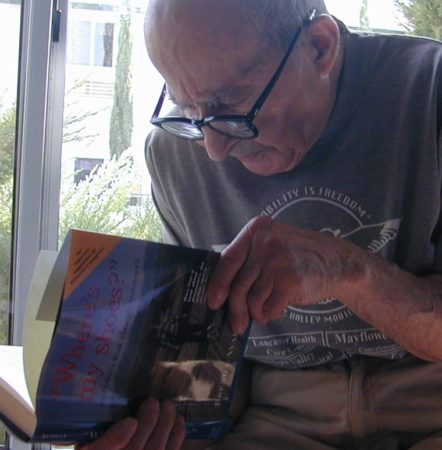Almost twenty years ago, I finished writing “Where’s my shoes?” My Father’s Walk through Alzheimer’s. It was released in hardcover in 1999. My father observed: This Alzheimer’s must be an important subject to have such a big book about it!
 I had already written four books and this was the most difficult. It was my first memoir. The second edition was even harder to write and took four years. Today, with the abundance of caregiver books, many that I have read and written about at The Caregiver’s Voice Review, I wonder if a third 20th Anniversary Edition would fill a void.
I had already written four books and this was the most difficult. It was my first memoir. The second edition was even harder to write and took four years. Today, with the abundance of caregiver books, many that I have read and written about at The Caregiver’s Voice Review, I wonder if a third 20th Anniversary Edition would fill a void.
As I muse upon this, I reflect upon how far we’ve come since I wrote the first and second editions and did the interview, below. Like caregiving books, we have access to more sources of information and resources.
The interview is now only available via the internet archive (or the Wayback Machine). While the date stamp reads 2015, the interview was conducted years earlier. Caring.com’s team often posts updates of older posts. [Interview has been abridged and edited.]
When you’ve spent your entire life under the guidance of your parents, caring for them in their old age can be complicated. The reversal of roles often brings on feelings of confusion, frustration, sadness, and surprise. Brenda Avadian – Caring.com Expert knows all these emotions well, and she describes them in her new book, “Where’s My Shoes?” My Father’s Walk through Alzheimer’s, an account of her time as a caregiver for her father. [This second edition was published in 2005, two years before Andy Cohen founded Caring.com.]
Is there anything about caring for your father with Alzheimer’s that you were completely unprepared for? What do you wish you had known beforehand?
The scope of caregiving.
Who can imagine everything required to care for a loved one? I’m caring for an 86-year-old who needs help because dementia has rendered his brain into that of a child’s. But wait! He’s my father! I can’t treat him like a child.
In Where’s My Shoes? you describe your father undergoing episodes during which he would act in ways that were completely uncharacteristic of his normal behavior. What warning signs of Alzheimer’s were most obvious in the case of your father? Least obvious?
Forgetfulness and disorientation.
I remained blind because I wanted to preserve his independence and dignity. It was unnerving to hear him ask, “Were you in the neighborhood?” (I live in California and he lived in Wisconsin.) “Where’s Ma?” (Both my mother and grandmother died years earlier.)
The surprise came with his unchecked sexuality. Yikes! My father was proper about such things during our upbringing. Heck, I couldn’t even get him to share a swear word in Armenian! While caring for him, I tried to reconcile in my mind and heart that dementia was causing his confusion, versus feeling violated by his sexual advances.
What helped you come to terms with the fact that you needed help caring for your father?
I was out of my league. Truly.
Even caregivers who have had experience raising children are unnerved by the role-reversal. At least, they can draw on their experience caring for fellow humans. All I had were cats: Clean the litter box, feed twice a day, and pet regularly. Easy enough.
Where does one draw experience to care for one’s 86-year-old father with dementia? I needed help to acquire some measure of competency implementing the very different skill set required for caregiving.
What was your biggest challenge as your father’s power of attorney?
[Click on title link above to read the answer to this question.]
Throughout the whole process, what did you find to be the most rewarding thing about caring for your father?
There were moments that seemed most rewarding along the way:
- His humor. For example, after we convinced him our house was his (so he wouldn’t feel he was a burden), when we didn’t see eye to eye on an issue, he told us, “Get out!”
- Learning to treasure the smallest joys, such as when he called me by name.
- Learning to be patient and growing my capacity for empathy. (When I have this disease, how will I want to be cared for? I asked this question many times to guide my actions as a caregiver.)
- His childlike innocence. His joyous “discoveries” of even the mundane details, like a street sign.
- Being invited to speak to national audiences on “Surviving Caregiving with Humor,” as I was living the experience and afterward.
- Learning what matters in life. It’s hard to keep focused on the answer – people – when temptations and materialism are all around us. But the truth is, we are born and then we die. In between, we live. People, not things, help us celebrate life’s joys and comfort us during life’s sorrows.
Which part was the most difficult?
[Click on title link above to read the answer to this question.]
Your book is dedicated to your father, who, you mention, taught you the value of perseverance. What helped you persevere when caring for your father was hard?
[Click on title link above for answer to this and two more questions.]









